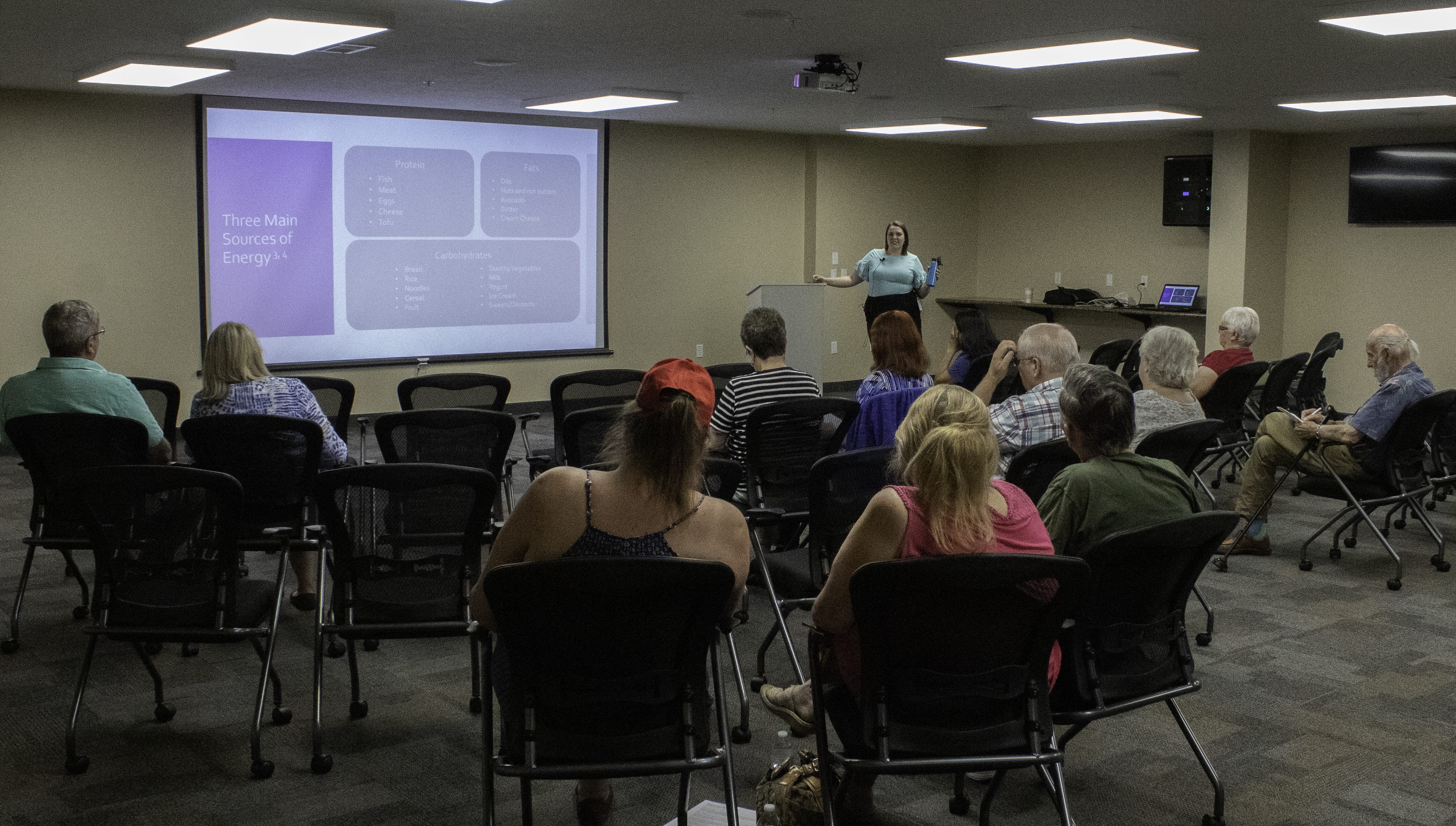ST. GEORGE— The Southwest Utah Public Health Department discussed how people with diabetes should approach nutrition Thursday night as part of their monthly Diabetes and Prediabetes Community Forum.
Mallory Spendlove, a dietitian with the health department, spoke to the audience about how nutrition affects the development and treatment of diabetes and what kind of diet works best to help manage and prevent type 2 diabetes.
“When you have a balanced diet with diabetes, it can definitely help control your blood sugar,” Spendlove said. “And when your blood sugar is controlled then you don’t have the complications that tend to come with diabetes.”
Type 2 diabetes occurs when the person’s cells become resistant to insulin, allowing sugar to build up in the bloodstream instead of moving into the body’s cells to be used for energy.
Without the right amount of insulin to control the blood sugar, it can spike and drop depending on what the person eats, causing side effects such as headaches, irritability, hunger and fatigue, among others.
By eating a balanced diet and reducing carbohydrate intake, those with diabetes can help to manage and treat some of these symptoms, Spendlove said.

However, there is no one-size-fits-all diet for people with diabetes, she said. While it is recommended to lower the intake of carbohydrates and fats and eat more fruits, vegetables, lean proteins and fiber, how each individual does that depends on their lifestyle, body and preferences.
“With diabetic diets, there isn’t one. There is no specific eating pattern that will either give you diabetes or help you manage it,” Spendlove said. “There are a few that work really well, but there’s no specific diet for diabetes.”
Despite this, Spendlove said one thing to watch out for is diets that cut out carbs altogether such as the Atkins diet or the ketogenic diet, which can cause hypoglycemia, or low blood sugar, in those with diabetes. There are three main sources of energy: carbohydrates, fats and proteins. All three sources need to be present in each meal for a healthy diet.
Spendlove said that those trying to manage diabetes should spread their meals out throughout the day, eating up to six meals total, three main meals and three snacks. Those with diabetes should never skip a meal, as it can put them at risk for hypoglycemia.
While those who are taking insulin to manage their diabetes should make it a habit to read food labels to ensure that they are getting healthy amounts of all three categories, this isn’t always possible. For those who are eating at restaurants or places where food labels may not be easily accessible – or for those proactively trying to prevent diabetes – Spendlove suggested the “plate method.”
The plate method involves taking a 9-inch plate and filling half of it with a vegetable, a quarter of it with lean protein and a quarter of it with carbohydrates such as grains or starches.

“It’s just so easy. You can visualize it. You can know if half of your plate is vegetables, and then you get a little bit of protein and a little bit of starch … It’s just super simple,” Spendlove said.
Protein can include things like chicken, fish and tofu, while carbohydrates should preferably include whole grains or fruit.
Fiber is also a large factor in a healthy diabetic diet – or any diet – Spendlove said. Fiber has many benefits, including reducing the risk of heart disease and even cancer. It is also a carbohydrate that those with diabetes don’t have to regulate because it has no effect on blood sugar. Using the plate method can reduce concerns about receiving enough fiber, as there should be plenty of it in the vegetables.
Part of what makes it difficult to create a diabetic diet is that there are no “forbidden foods.” People with diabetes can eat anything they want, as long as it is in moderation and does not exceed the number of carbohydrates they should eat in a day. Exercise also helps to balance the sugar levels in the body, and Spendlove said not eating a proper diet every once in a while won’t necessarily hurt.

“One or two meals isn’t going to have a large impact over time. It’s what you do every day consistently that’s going to have the biggest impact,” Spendlove said.
The health department offers its Diabetes and Prediabetes Community Forum every second Thursday of the month from 6-6:50 p.m. at their St. George office. The goal of the forum is to have a different diabetes expert speak on different topics each month and then to open it up for audience questions and discussion. The forum is free and the public is invited to attend.
“Sometimes I think it’s hard to get good reliable information,” Jeff Smith, the department’s diabetes program development manager, said. “There’s a lot of information out there, but I think it’s good to have a place where the community can come together and learn from each other and also from experts that we invite to talk about it.”
The health department also offers both in-person and online classes for people with diabetes to learn more and ask questions. Those who complete the online class have the opportunity to schedule a coaching call with Spendlove to learn more about what nutritional needs they have as an individual to manage their diabetes.
For more information on the diabetes resources and screenings offered by the Southwest Utah Public Health Department, visit the department’s diabetes webpage.
Email: [email protected]
Twitter: @STGnews | @MikaylaShoup
Copyright St. George News, SaintGeorgeUtah.com LLC, 2019, all rights reserved.